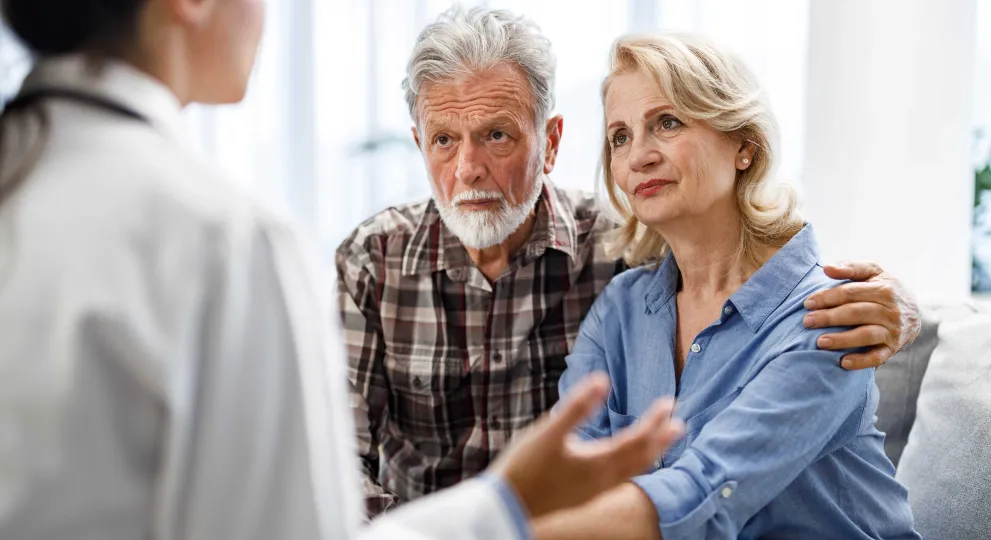Relapsed or Refractory diffuse large B cell lymphoma (DLBCL)
Relapsed or Refractory diffuse large B cell lymphoma (DLBCL)

Diffuse large B cell lymphoma (DLBCL) is considered a rare blood cancer—but it is the most common type of non-Hodgkin lymphoma. Approximately 18,000 people are diagnosed with DLBCL each year. It is slightly more common in men than women, and most people are over the age of 60 at diagnosis.
While DLBCL often responds well to treatment, about 40% of people will experience a relapse or have refractory DLBCL. Relapsed DLBCL is when your cancer returns after a period of improvement and refractory DLBCL is when your cancer doesn’t respond to treatment.
Signs of relapsed DLBCL can vary. Contact your doctor if you experience any of the following symptoms:
- Swollen lymph nodes lasting more than a few weeks
- Drenching sweats lasting more than a few weeks
- Unexplained weight loss
- Worsening fatigue
- Itching
- A rash, if you have skin lymphoma
- A change in bowel patterns
- Persistent or unexplained pain
If your doctor thinks your cancer has returned, they will run tests, which may include blood tests, scans, and maybe a biopsy to confirm your diagnosis.
What happens next
Your doctor will reassess the stage and subtype of your cancer
The stage and subtype of your lymphoma may change over time. Your doctor will need to run some tests to determine the current stage of your cancer and the subtype. This will help you and your care team evaluate different treatment options and develop the most appropriate treatment plan.
You have different treatment options
If your initial treatment did not work or your cancer came back, there are different treatment options that may be available to you.
Stem cell transplant
A stem cell transplant uses healthy stem cells to rebuild the immune system after chemotherapy and attack cancer cells that remain in your body. Your own stem cells, or a donors may be used. Your care team will work with you to determine the most appropriate location for your transplant. This could be the hospital, an outpatient center, or a combination of both. If hospitalization is necessary, you'll typically be admitted the day before starting any pre-transplant chemotherapy or radiation treatments.
CAR T-cell therapy
CAR T-cell therapy is made by removing T cells from your body and then training your own immune cells to fight the lymphoma for you by adding a CAR ( chimeric antigen receptor) to the T-cells. This programs the T-cells to find cancer cells. The programmed T cells will be infused back into your body to find and kill cancer cells. CAR T-cell therapy is offered at specific treatment centers and does require staying at, or near, the treatment center for therapy.
Bispecific Antibody Therapy
Bispecific antibodies (BsAbs) bind to 2 different proteins (CD20 and CD3) at the same time. They treat cancer by engaging T cells. It may be given as an injection or an infusion at the hospital. Your first dose may require hospitalization in order to monitor your reaction to treatment.
Travel or Lengthy Hospitalizations Not an Option?
While support may be available to help make travel and lodging easier, not everyone can stay at a specialized hospital for weeks to receive and recover from treatment. There are other treatment options that may be able to help.
Chemotherapy
Your doctor may suggest chemotherapy. Different regimens may be used than when you were initially treated for DLBCL. Chemo may be used alone, or in combination with other treatments.
Targeted Therapies
Targeted therapy is a type of cancer treatment that uses drugs or other substances to identify and attack certain types of cancer cells. Types of targeted therapies your doctor may mention include antibody drug conjugates and monoclonal antibodies. Some monoclonal antibodies may also be considered immunotherapy because they help activate the immune system against cancer.
Immunotherapy
Immunotherapies increase the activity of your immune system to improve your body’s ability to find and destroy cancer cells. Types of immunotherapies your doctor may mention include monoclonal antibody therapy, and immunomodulator therapy.
Clinical Trials
Clinical trials test new ways to find, prevent, and treat cancer. They are used to determine how well a treatment may work and if it is safe to use in people. All new treatments must go through clinical trials before being approved by the Food and Drug Administration (FDA). Ask your doctor if you are interested in joining a clinical trial. You can also search for a clinical trial at https://www.clinicaltrials.gov/.
These are not all the treatments that may be available to you. Ask your doctor for a complete list of your treatment options.
Get a second opinion
It might be helpful to get a second opinion on your treatment plan. This is very common and your doctor may even be able to assist you in finding another specialist or hospital for consultation. You deserve to know all your treatment options and the peace of mind that comes with a second opinion.
Find a support group
This may be a point in your life where you need help. Connect with other people in your situation or find advocacy support. Having cancer return or resist treatment is not something you need to take on alone.









